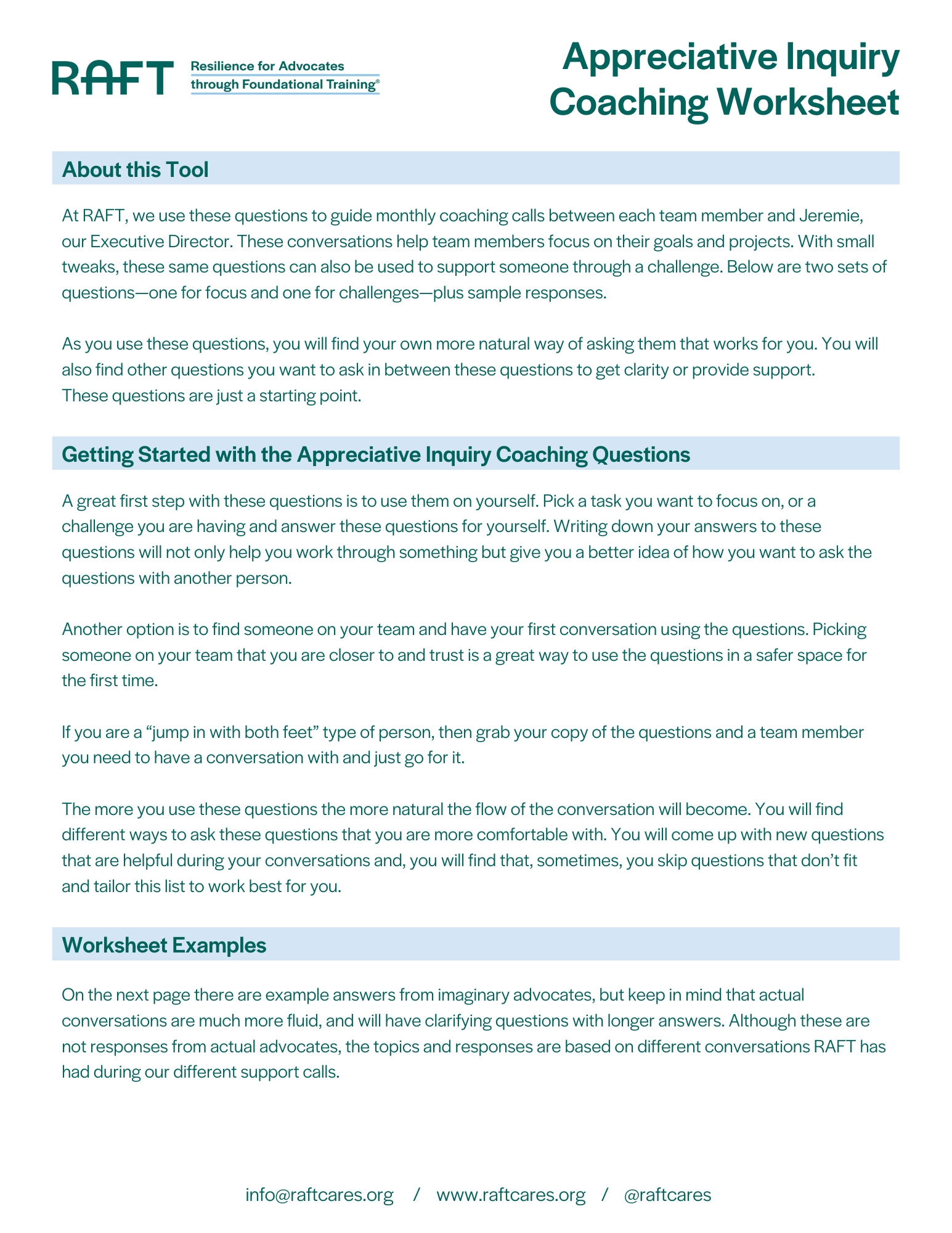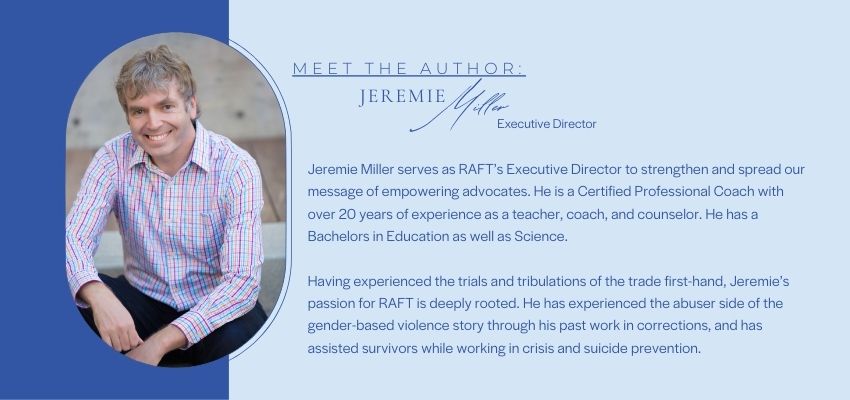Build a More Positive Workplace: 6 Ways to Create an Appreciative Mindset
Jeremie Miller, June 10, 2025
An appreciative mindset is an approach to thinking and problem-solving that encourages you to focus on positive experiences, strengths, opportunities, and potential - rather than dwelling on negative experiences, deficits, and problems.
RAFT began building an appreciative mindset in 2022 when we used an appreciative inquiry facilitation for our strategic planning process, then used it again to discover what belonging means for everyone at RAFT. In the past three years RAFT has continued to use larger appreciative inquiry facilitations, but we have also been integrating numerous smaller appreciative mindset practices throughout our organization. I want to share some of these more bite-sized appreciative practices with you:
- Sharing gratitude in meetings
- Spotlights and stoplights
- Acknowledging and Appreciating great work
- Shifting conversations to the positive
- Appreciative coaching
- Embracing failure as a positive.
As you read through these six examples, don’t feel like you need to do all of them at once. The key is to pick one or two ideas to get started – small steps that can begin to build an appreciative mindset in your organization.
(If learning more about RAFT's free appreciative inquiry facilitations, and how they can benefit your organization, is of interest feel free to email outreach@raftcares.org)
Sharing Gratitude in Meetings
This is an appreciative mindset approach you can start using immediately with no extra time or energy beyond adding it to your meeting agenda.
RAFT begins every team meeting with each person taking a moment to share something or someone that they are grateful for in their life. These gratitudes can be as small as being thankful for a cup of coffee or as big as finishing school or winning an award. The process is quick and simple:
- One person starts and shares their gratitude.
- When finished, they call on someone else to share theirs.
- Repeat until everyone has shared a gratitude.
Try this at your next meeting and notice how the overall mood and tone shift simply by sharing a gratitude before jumping into the, often serious, agenda.
Spotlight/Stoplight
This is another quick appreciative practice you can try by adding a new agenda item to your team meetings.
During meetings at RAFT, each person has an opportunity to share either a "spotlight" (something positive happening with their work), or a "stoplight" (something they need support with). This shifts the focus away from blame or complaints, and toward celebration or solution-seeking by allowing a team member to share something great that is happening instead of a challenge. If they do share a challenge, they know that the team will focus on what support or resources are needed to help with the challenge.
Here’s how we do it:
- Invite each person to share either a spotlight or stoplight.
- The person shares what’s happening.
- If it’s a spotlight: we listen, ask questions, celebrate, and show appreciation.
- If it’s a stoplight:
- We listen to the challenge.
- Ask what support is needed.
- Identify resources that can help.
- Make commitments to provide support.
- Decide if a follow-up meeting is needed.
- Move on to the next person.
This approach helps the team handle challenges with a forward-looking, supportive mindset with no need to focus on the negative – and team members feel more comfortable sharing both wins and struggles.
Acknowledge and Appreciate Great Work
RAFT’s “Road to Advocate Wellness” survey and our support calls consistently highlight how important it is to let your colleagues know their work is seen and valued. This goes beyond acknowledging people's successes, especially in gender-based violence work where someone may have done their best and still got a negative result. This can include acknowledging and appreciating what has been done in a team member's personal or professional life. Taking the time to acknowledge and appreciate others is a great way to show that you are listening, aware, and care about the people you are working with.
At RAFT we:
- Start many meetings with time for casual conversation that allows space for personal or work updates, where appreciation flows naturally.
- End most meetings with “appreciations,” where everyone gets a moment to appreciate someone or something.
- Share spontaneous appreciation throughout the week as part of our culture.
To learn more about celebrating great work and importance of rituals and meaning making listen to this podcast with Heather Slutzky.
Shifting conversations to the positive
As a team RAFT works hard to not blame someone or focus on what has been done wrong. Instead, we apply our appreciative mindset and look at how we can support team members, what resources are needed, what strengths can be used, and who on the team can help.
The "Name it, flip it, frame it" tool from the book Conversations Worth Having is a tool we use to shift conversations in a positive, strengths-based direction while still discussing the problem that needs solving. It works in three simple steps:
Name it: clearly identify and state the problem. ("People are not getting their timecards in on time.")
Flip it: restate the problem to its positive opposite. ("People are getting their timecards in on time.")
Frame it: describe what you would experience and how your team or organization would look and feel if the positive opposite was true. ("People wouldn't be worried about getting paid on time, grant reports wouldn't be late, our payroll person wouldn't be stressed, leadership could focus on other work instead of tracking people down.")
Now that the conversation is focused on what people want to create, you can start looking for ways to support team members, provide resources, use strengths, and create an action plan - instead of getting stuck in the negative discussing mistakes, assigning blame, or trying to fix things.
The more you and your team use the "Name it, flip it, frame it" tool the easier it becomes to switch your thinking in a positive direction and approach challenges differently.
Appreciative Mindset Coaching
Annual performance reviews are an uncomfortable, anxiety-inducing experience that no one truly enjoys. Who really benefits from waiting a whole year to hear about what they’ve done right or wrong?
Instead of relying on annual performance reviews, you can take a more appreciative approach and check in with your team more often using quarterly or monthly coaching conversations.
RAFT began implementing appreciative coaching conversations in 2024. Although not every conversation ends up following a specific script, this is the list of coaching questions we reference:
- Tell me about one of the best work experiences you’ve had since we last talked?
- When you think about that best experience what do you want more of from that experience?
- What would you like to focus on this upcoming week/month/quarter?
- What do you hope to accomplish with this focus? What is your vision of success?
- How could you include more of what you wanted from that earlier experience in this focus?
- Which of your strengths of yours will help you succeed?
- Who could you reach out to or collaborate with?
- What resources or support might you need?
- What results will help you know that you are succeeding?
- Once this focus is completed, what other opportunities might open up?
- What action(s) will you commit to before we meet again?
Having ongoing coaching conversations builds performance feedback into a monthly conversation that focuses on goals, growth, and support while still leaving room for discussing challenges people are experiencing. If you don’t have time to fully implement coaching conversations, have people on your team use these questions on their own to reflect and plan future steps.
(You can download an Appreciative Inquiry Coaching Worksheet here: Download Here)

Embracing Failure as a Positive
Probably the biggest integration of the appreciative mindset at RAFT is in our approach to, well, almost everything: our core value of "Fail. Learn. Grow."
We try our best (we’re not perfect) to approach every mistake, challenge, and opportunity as a chance to fail, learn, and grow. By creating a culture where failure is seen as useful, not shameful, we’ve shifted from punishing mistakes to learning from them and doing better.
Examples:
- Someone mixed up a calendar invite? Let's take this opportunity to debrief and look at the changes we need to make so the same mistake isn't repeated.
- Someone wants to create a new workshop? We let them create it, test it in a pilot, then debrief the whole process to see what we need to do next.
- Someone wants to try outreach calls for the first time? We support them with training and shadowing, set boundaries and a timeline, and then debrief the process to figure out what worked, what didn't and what support and resources that person needs to have more success the next time.
What we’ve learned is that the debrief is key. Without debriefing, the “learn and grow” part gets lost. We’re still improving this process, but we’re closer to a system that works. You can read more in our full blog post about “Fail. Learn. Grow.”
The Appreciative Mindset Grows as You Use it More
Looking back on my own journey as a leader at RAFT there are definitely moments, I’m not proud of – decisions I could take back. But, building an appreciative mindset, personally and as part of RAFT's culture, has reduced these moments and had a positive impact on my leadership. I think the rest of the RAFT team would agree that an appreciative mindset helps make RAFT a positive and healthy place where people want to work.
Hopefully, one of the six ideas in this post jumps out, grabs your attention, and makes you think "I can do that" or "our organization can do that." That’s all it takes to get started.








